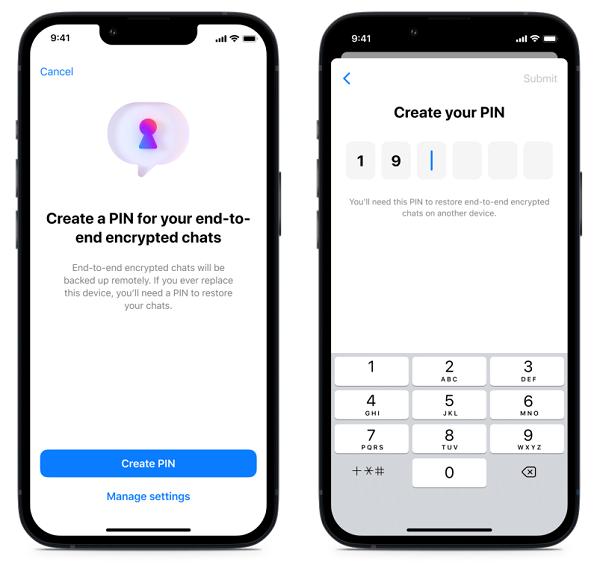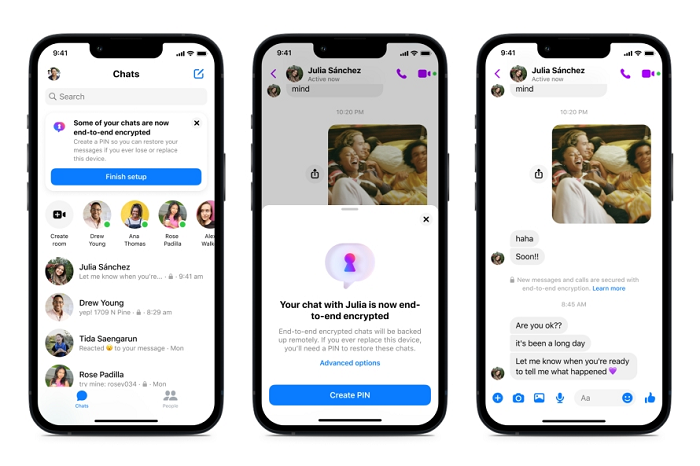Despite ongoing protests from various law enforcement groups and policy-makers around the world, Meta is pushing ahead with its plan to implement end-to-end encryption by default in all of its messaging apps, with the company today announcing that it’s testing a new secure storage process for backups of your end-to-end encrypted chats on Messenger, along with a range of other expanded encryption tests on Messenger and Instagram.
The main update is the addition of E2E encrypted chat back-ups for Messenger chats.
As explained by Meta:
“Your message history is important, and end-to-end encrypted Messenger conversations are currently stored on your device. With that in mind, we’re testing secure storage to back up those messages in case you lose your phone or want to restore your message history on a new, supported device.”

The process will see your messages stored in an encrypted server, which will only be accessible via PIN or a code generator. Meta has also reiterated that it won’t be able to access these messages, in line with encryption standards, which will enable secure back-ups of your chats, that you can then access from any device.
That could make it much easier when switching devices, while it will also move Messenger in closer parity to WhatsApp, which is the ultimate end goal of Meta’s broader messaging integration plan. Once the functionalities of all of its messaging platforms are in alignment, Meta will then be able to facilitate full cross-app messaging, and universally accessible inboxes, which could help to maximize its messaging tools.
In addition to this, Meta’s also rolling out automatic encryption of chats for some users.
“If you’re in the test group, some of your most frequent chats may be automatically end-to-end encrypted, which means you won’t have to opt in to the feature. You’ll still have access to your message history, but any new messages or calls with that person will be end-to-end encrypted.”

Which is a significant step in Meta’s broader messaging encryption plan, removing the opt-in element, and shifting people across to the more secure process, whether you want to or not.
Meta’s also testing new encrypted features, like ‘unsend messages’, the capacity to reply to Facebook Stories, and new ways to access your end-to-end encrypted messages and calls.
“For example, we plan to bring end-to-end encrypted calls to the Calls Tab on Messenger. End-to-end encrypted chats are also going hands-free with Ray-Ban Stories (English-only). That means, if you have an existing end-to-end encrypted chat with someone, sending a hands-free message on Messenger for Ray-Ban Stories will be end-to-end encrypted.”
Meta’s also taking steps to expand its messaging encryption tools on Instagram, with an expanded test of opt-in encryption for Direct chats.
“Last year, we started a limited test of opt-in end-to-end encrypted messages and calls on Instagram, and in February we broadened the test to include adults in Ukraine and Russia. Soon, we’ll expand the test even further to include people in more countries and add more features like group chats.”
Meta says that its initial test was only available to adults, but this new expansion will be made available to everyone.
“If you’re in the test group, you’ll see a prompt asking if you want to start an end-to-end encrypted chat, and a reminder of how to report messages.”
It’s the next stage in Meta’s broader messaging integration, which, as noted, continues to raise the ire of various law enforcement groups, who say that more encryption will only serve to protect criminals that operate within Meta’s apps.
The Home Office in the UK has been one of the most vocal opponents to Meta’s encryption plans, with the watchdog sending an open letter, co-signed by the ‘Five Eyes’ countries (along with India and Japan), back in October 2020, which urged the tech industry to provide ‘lawful access’ to encrypted communications for criminal investigations. Earlier this year, the UK government hired M&C Saatchi to create a media campaign to help amplify opposition to Meta’s end-to-end encryption plans, which highlighted the risks of child exploitation as a result of such protections.
Yet, there is also a counter perspective, with a report from the UK Information Commissioner finding that encrypting communications actually strengthens online safety for children “by reducing their exposure to threats such as blackmail, while also allowing businesses to share information securely”.
It’s not a definitive argument, and Meta’s leaning more into user privacy, which is largely in line with broader shifts around data protections and choice, which are being embedded in law in various regions.
These new updates are another step in that direction, which is still subject to debate and disagreement in various quarters.



